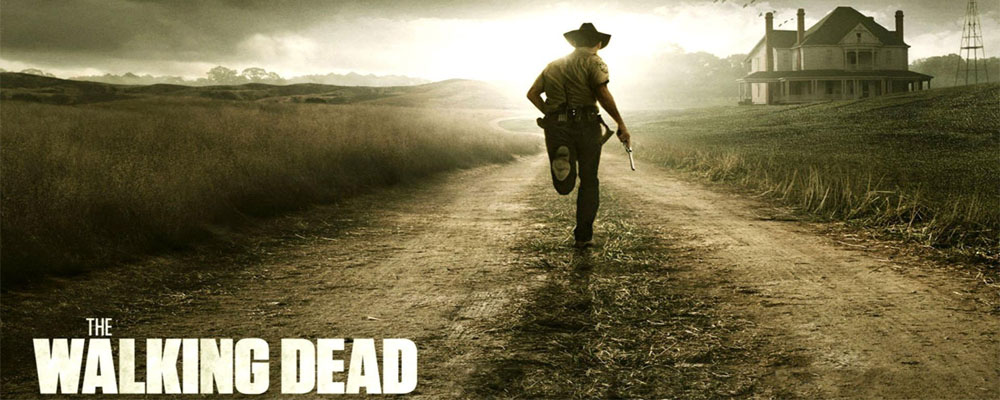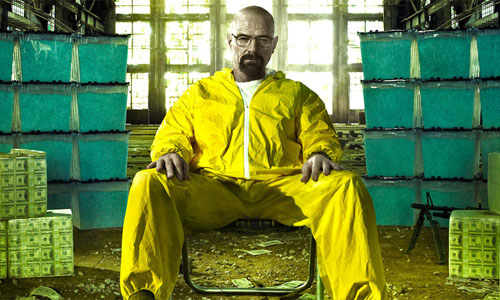 KFLAP.COM
KFLAP.COM
 KFLAP.COM
KFLAP.COM

The Walking Dead Season 1-3 Review
AMC's The Walking Dead has taken the TV world by storm since the first series of the TV adaptation burst onto the scene in 2010, and has hordes of fans as large as the hordes of zombies it features. The series has indeed been very popular, so I'll be looking into why it's been so well-received.
Characters are also treated with a good helping of gritty realism. None of them are categorically heroes for starters- they're survivors, not Rambo-wannabes, and so they often take questionable decisions and avoid conflict at all costs. Even if there are heroes, then they're definitely not perfect- everyone makes mistakes or commits atrocities at some point, and these mistakes often have consequences which range from political struggles to actual casualties. Oh yes- AMC are not afraid to kill off characters either. From series 1 to 3, around 11 of Rick's group meet their ends. The characters are well-portrayed to make it feel like it's a survival movie because they're only human; they're not always right, they make mistakes, and sometimes they don't win. It's this fallibility that keeps tension running high throughout the series as the viewer can't always predict what might happen, just like the characters they're viewing. Having said that, the show runners did go overboard with the deaths a little in series 3, and it did feel like they were killing off characters just because of the contracts they'd signed- so it's not always a good call from the people behind the scenes.
Series 2 starts off much more slowly in the first half, and there isn't much progression- for pretty much half the series the group are on the trail of the lost Sophia, and many of the series' episodes seem like various different iterations of essentially the same plotline. However, the series really picks up in the second half after the plot gets moving again, and the plot twists more dramatically than a world-champion gymnast in a tornado by the finale, which eclipses series 1's finale completely and ultimately redeems the series with apocalyptic proportion and superb acting from Lincoln and Bernthal (who play Rick and Shane respectively). Throughout the series, tension is very well built up in the fragmentation of the group into different factions and would-be leaders, which is what leads to this epic final episode.
Series 3 has the opposite problem to series 2. Where series 2 had a slow plot but an awesome finale, series 3 magnificently builds up tension between Rick's group and that of the Governor's (shifting the focus away from walkers and to other human groups), doing very good work in the process and leading viewers to think that the two sides will go to a massive war, with the Governor besieging the prison Rick's group have holed up in, but this conflict, the product of 15 episodes, lasts all of 2 minutes and ends with the Governor having a hissy fit with his own people. In series 3 the finale was really rather disappointing after an otherwise well-worked plot, unlike series 2.
Overall, Walking Dead's plot is captivating apart from a few niggling episodes in series 2 and 3 that are either too slowly developed or don't do justice to the series build-up.
9/10
Realism
The majority of zombie post-apocalypses suffer from the same problems: a slow, dull, barely-believable set of extras who cause a spike in the share prices of Heinz and cosmetic companies. However, Walking Dead's lot are much more realistic and "dead-looking" than most of their counterparts from older zombie flicks. They certainly are more gory, and behave more plausibly- more like pack animals than completely braindead and utterly useless zombies of the past. They run and they can climb (sometimes), and so they pose a slightly more real threat than a stereotypical zombie might, which keeps the tension ticking.Characters are also treated with a good helping of gritty realism. None of them are categorically heroes for starters- they're survivors, not Rambo-wannabes, and so they often take questionable decisions and avoid conflict at all costs. Even if there are heroes, then they're definitely not perfect- everyone makes mistakes or commits atrocities at some point, and these mistakes often have consequences which range from political struggles to actual casualties. Oh yes- AMC are not afraid to kill off characters either. From series 1 to 3, around 11 of Rick's group meet their ends. The characters are well-portrayed to make it feel like it's a survival movie because they're only human; they're not always right, they make mistakes, and sometimes they don't win. It's this fallibility that keeps tension running high throughout the series as the viewer can't always predict what might happen, just like the characters they're viewing. Having said that, the show runners did go overboard with the deaths a little in series 3, and it did feel like they were killing off characters just because of the contracts they'd signed- so it's not always a good call from the people behind the scenes.
Plot
After introducing us to Rick, the main protagonist we will see over the coming series, series one dives straight into the action, providing a nice and quick summary of the situation (which isn't good, whichever way you look at it). Anyway, after this thankfully short intro -which signposts but doesn't patronise or loiter- episodes after it are well-paced and there is clear plot development from episode to episode; over 7 episodes we see Rick meeting a group of survivors outside Atlanta, being accepted into their ranks, before getting involved in their problems. In this way, the series propels itself forward very quickly but effectively plot-wise, dropping some bombshell plot twists along the way, including a shocking revelation at the finale. In general, the plot progresses well while being thoroughly entertaining.Series 2 starts off much more slowly in the first half, and there isn't much progression- for pretty much half the series the group are on the trail of the lost Sophia, and many of the series' episodes seem like various different iterations of essentially the same plotline. However, the series really picks up in the second half after the plot gets moving again, and the plot twists more dramatically than a world-champion gymnast in a tornado by the finale, which eclipses series 1's finale completely and ultimately redeems the series with apocalyptic proportion and superb acting from Lincoln and Bernthal (who play Rick and Shane respectively). Throughout the series, tension is very well built up in the fragmentation of the group into different factions and would-be leaders, which is what leads to this epic final episode.
Series 3 has the opposite problem to series 2. Where series 2 had a slow plot but an awesome finale, series 3 magnificently builds up tension between Rick's group and that of the Governor's (shifting the focus away from walkers and to other human groups), doing very good work in the process and leading viewers to think that the two sides will go to a massive war, with the Governor besieging the prison Rick's group have holed up in, but this conflict, the product of 15 episodes, lasts all of 2 minutes and ends with the Governor having a hissy fit with his own people. In series 3 the finale was really rather disappointing after an otherwise well-worked plot, unlike series 2.
Overall, Walking Dead's plot is captivating apart from a few niggling episodes in series 2 and 3 that are either too slowly developed or don't do justice to the series build-up.
Verdict.
Walking Dead, apart from a very small number of less good episodes, gives a fast-paced, dynamic and incredibly gritty approach to a zombie apocalypse with both plausible and likeable characters. The actual storyline itself provides a whole host of twists and turns which keep the show interesting and maintain its novelty, and for those reasons the Walking Dead fully deserves it's vast amounts of support.9/10
About the author: Sam Robinson
 The Senior Content Editor for Kflap.com, Sam is a student with a passion for Film and Video Games.
The Senior Content Editor for Kflap.com, Sam is a student with a passion for Film and Video Games.
 RELATED POSTS
RELATED POSTS
